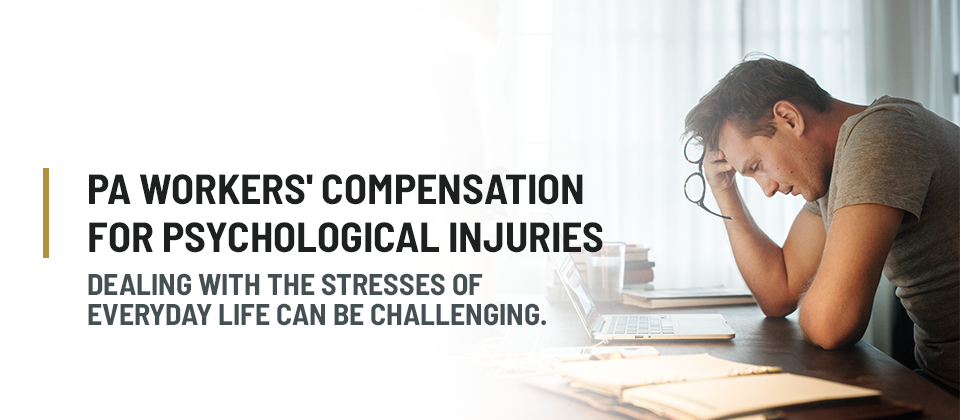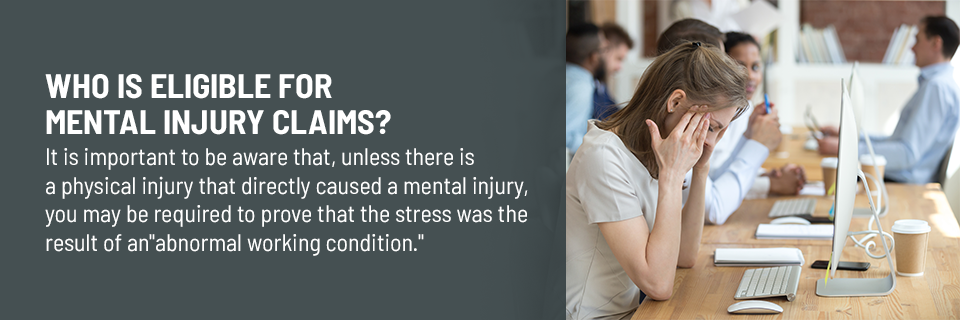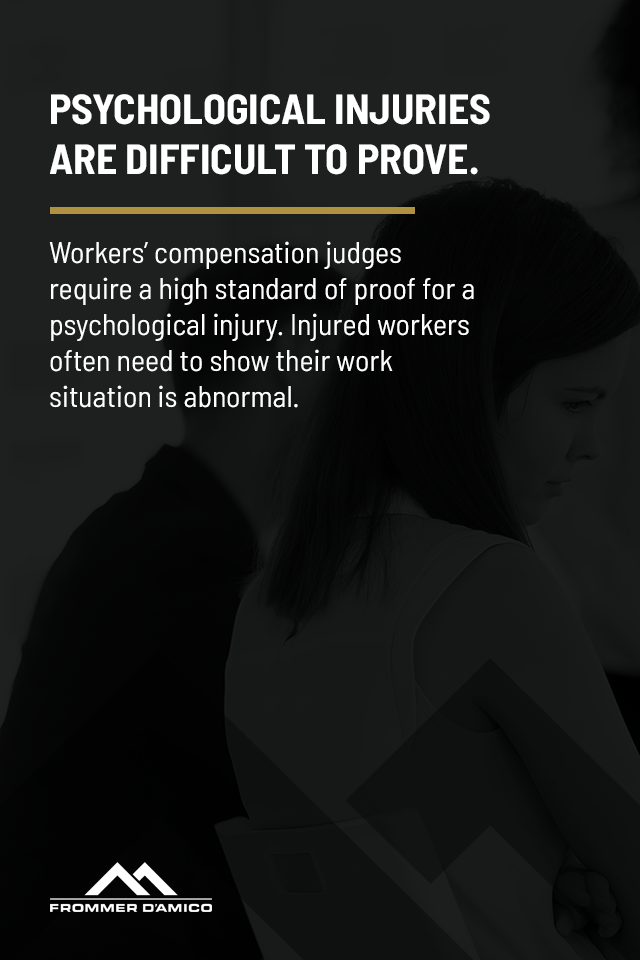Dealing with the stresses of everyday life can be challenging. Some days it seems like stress looms around every corner — making sure your kids catch the school bus on time, pondering if you need to fix that weird noise your car is making, worrying if you have enough money to pay all the bills every month.
The workplace supplies arguably the greatest amount of stress. You worry if doing your job correctly, how you interact with your co-workers, how to deal with a hostile boss, if you can get that big important project done on time, how to work in a noisy office, and so forth. Some people handle workplace stress OK, but it’s not easy for everyone. Stresses can lead to symptoms that can negatively affect your mental and physical state.
If the stress becomes too much for an employee to deal with, it can result in a psychological injury — an emotional or cognitive symptom that affects their lives. In Pennsylvania, the workers’ compensation system covers psychological injury that affects an employee’s ability to do their job in certain situations. Though mental injury claims at work can be difficult to prove, with the assistance of an experienced workers’ compensation attorney, you may qualify for workers comp for mental health benefits because of psychological injury.
What Is a PA Mental Injury Claim?
If you want to file a workers’ compensation claim based on psychological injury, it will probably fall under one of these three types of psychological injuries:
- Physical-Mental Injury: A mental injury can occur as a result of a physical event. If you suffer a work-related injury while using a piece of equipment, using that equipment again may create a level of anxiety or fear that makes it difficult for you to do your job.
- Mental-Physical Injury: Mental distress can result in physical injuries. If you work in an occupation where it is important that you do your job correctly or you may be terminated, the worry and stress that result can affect you physically. Severe migraines, ulcers or heart attacks are possible outcomes of this kind of mental distress.
- Mental-Mental Injury: Workers’ compensation systems differ from state to state. Many states do not recognize mental-mental injuries as eligible for worker’s compensation. Pennsylvania does. This is an injury that develops as a result of a psychological trauma experienced in the workplace. Your bank is robbed. There is an active shooter incident at your company. An explosion occurs at your workplace. All these incidents can cause you to develop depression or anxiety if you feel that your life has been endangered.
Who Is Eligible for Mental Injury Claims?
Under Pennsylvania law, any business or individual in Pennsylvania employing more than one person is legally required to participate in the workers’ compensation system. While there are some exemptions, including federal employees, longshoremen, railway workers and some classes of agricultural workers, the state’s workers’ compensation system protects workers in all industries who sustain work-related injuries or illnesses. The Pennsylvania commonwealth and supreme courts have upheld numerous challenges to those laws. It is important to be aware that, unless there is a physical injury that directly causes a mental injury, many injured workers in Pennsylvania are required to prove that the stress was the result of an”abnormal working condition.” This is sometimes difficult to prove, and you should talk to one of our attorneys about your specific work environment.
There are many injuries or illnesses covered by workers’ compensation that do not occur as a result of accidents with machines, trips or falls, or lifting something too heavy. Anxiety, depression and other symptoms of mental illnesses may be harder to detect, but the effect they can have on a worker’s physical and mental state can be just as serious.
Examples of Mental Stress and Injury
So what are some of the causes of psychiatric injuries in the workplace? Here are five that play a critical role.
1. Harassment and Bullying
Sometimes the workplace can be just as hazardous for an adult employee as the schoolyard is for many children. A worker bullied by their boss or co-workers can develop a psychological injury. Bullying takes several forms — verbal, social, physical or psychological.
Sometimes bullying takes the form of excluding an individual from social gatherings or comments overheard on the shop floor or in the lunch break room. Co-workers bully when they play mind games, demand you accomplish pointless tasks, or push or trip you when you walk by.
Sexual harassment can be a serious problem, especially if committed by a supervisor or an employer. Many employees fear for their jobs if they report these actions, and so they suffer in silence.
2. Customer Service
Almost every employee who deals with customers can tell you a story about some kind of hair-raising experience. In too many cases, interactions with irate or challenging customers are a part of the job.
Employees who deal constantly with difficult customers may experience stress even when the angry customer leaves and the situation calms down. Many workers find that stress affects their reaction long after the customer has left. An employee who must deal with a particularly irate customer may worry about what happens when that customer returns or if they have to deal with a similar situation. In these cases, psychological injury is a real possibility.
3. Shift Work
Many studies have been conducted about the effect of shift work. People who work long hours each night face numerous health issues, such as chronic fatigue and diabetes. A 2016 British study found that nurses who work night shifts had significantly lower levels of job satisfaction as a result of psychological and physical stress.
Working different hours than other people also can lead to frustration. Employees who work night shifts deal with the psychological and physical symptoms of disrupting normal circadian rhythms and the psychological stress of knowing that they are missing important family or social events.
4. Workload
Regardless of the industry, employers may ask their employees to do more. Economic pressures, unfilled vacancies or illnesses could require remaining employees to work twice as hard under these conditions. Many employees can deal with this on a short-term basis. When these workloads continue for long periods, they can lead to:
- Depression
- Anxiety
- Poor performance
- Problems sleeping
Companies often set unreasonably high goals. These goals, unfortunately, leave many employees feeling inadequate and stressed about individual performance. When employees reach the point where it becomes difficult to unwind at the end of the day and leave the job at the shop or the office, they have reached a level of occupational stress that can create significant health problems.
5. Job Insecurity
Decades ago, employees counted on working at one job for their entire careers. Not anymore. The possibilities of mergers, organizational restructurings and downsizing leave many employees feeling emotionally stressed. Two long-term studies found that job insecurity takes a greater toll on people’s mental and physical health than being unemployed. The stress caused by job insecurity is a more significant predictor of poor health than even smoking.
Employees dealing with job insecurity worry about supporting their families or paying their mortgages or providing health care. They worry about being let go or terminated with little notice. This form of stress often lasts many years if the employer keeps the employee in a constant state of unease.
When Should I File a Claim for a Psychological Injury?
If you have been diagnosed with a psychological injury, you must treat it the same as any other work-related injury or illness. In Pennsylvania, an injured worker has 120 days to report their illness or injury to their employer. In some cases, and psychological injuries may fall in this category. An injured worker may not be aware of an injury or an illness until diagnosed by a physician. In these instances, the injured worker has 120 days after receiving the diagnosis to report it to their employer.
If an employer denies workers’ compensation benefits, an injured or ill worker has three years from the date of the injury or from the date of when they were diagnosed with an illness or an injury to file a workers’ compensation claim.
If you have been diagnosed with a psychological injury, report it to your employer as soon as possible. This is particularly the case with mental injury claims. Employers and their insurance carriers do not like to pay workers’ compensation benefits for any reason. They are especially reluctant to do so with psychological injuries. If you wait until the last second to report your injury, your employer’s insurance company will argue you are not really hurt because you waited so long to report it.
This is why you should contact an experienced workers’ compensation mental health attorney in PA as soon as you are diagnosed with a psychological injury. They can help you prepare your claim so you can receive the benefits to which you may be entitled.
How Can I File a Mental Stress Claim in PA?
Workers’ compensation in Pennsylvania covers work-related mental illnesses. Employers and their insurance companies are hesitant to provide mental injury workers’ compensation benefits for psychiatric injuries.
Psychological injuries are difficult to prove. Workers’ compensation judges require a high standard of proof for a psychological injury. Injured workers often need to show their work situation is abnormal.
If you believe you suffer an abnormal level of stress in your workplace, there are several things that you can do to prove your workers comp emotional distress case:
- Make a formal report to your employers: Make sure you follow company rules or regulations about filing this kind of report. This makes it a part of your employment record and can be used as evidence if you decide to make a mental health workers’ comp claim.
- Talk to trusted co-workers: Let them know how you feel. Make notes about their observations, which can also be used as evidence.
- Have a physician, a psychiatrist or a psychologist examine you: Medical evidence forms a key part of any workers’ compensation case, especially when dealing with psychological injuries.
- Record any instances of stress that manifest in a physical way: If you can’t sleep at night, if you have panic attacks or if you have suicidal thoughts, write them down.
- Keep a journal: This is especially important if you are dealing with workplace bullying or harassment. Record dates and events, the names of anyone present when the bullying or the harassment took place, what was said and how you dealt with it. Be specific. Detail counts when presenting evidence.
Potential Compensation for a Stress Injury
Psychological injuries qualify for the same kind of workers’ compensation benefits as other work-related illnesses or injuries:
- All relevant medical expenses will be covered, including the cost of transportation if you need to travel to receive treatment.
- Employees suffering from psychological injuries are eligible to receive wage-loss benefits. These benefits provide two-thirds of your average weekly wage for as long as you are unable to work.
- If your doctor says you can work with medical restrictions and your employer gives you a new job but it doesn’t pay as much as your previous job, you are eligible to receive two-thirds of the difference between the two positions.
- You can receive vocational training for a new job.
How long are you eligible to receive these benefits? Contact an experienced workers’ compensation attorney who can work with you to secure the best outcome in your workers’ compensation mental illness case.
Let Us Assist You With Your PA Workers’ Compensation
During this time, you need all the support you can find. Let our lawyers assist you with your mental health workers’ compensation case — we can come to your home to meet with you and learn more about your case. We’ll get all the details, then craft a strategy to help you achieve the best possible outcome.
Our lawyers are all board-certified workers’ compensation experts. We represent employees, never employers, and we don’t charge any case management fees. We only get paid from psychiatric workers comp settlements if you do too. Frommer D’Amico works exclusively on workers’ compensation cases, giving us the experience we need to craft the best strategy for your workers comp psychological injury case. Get in touch with us today by calling 717-888-8888 or fill out our online contact form.




